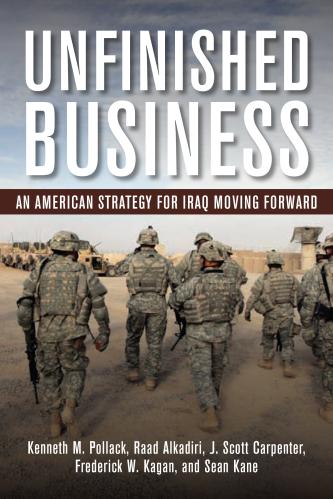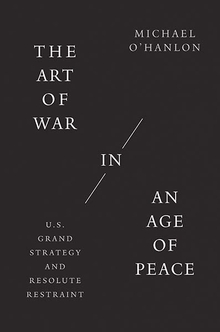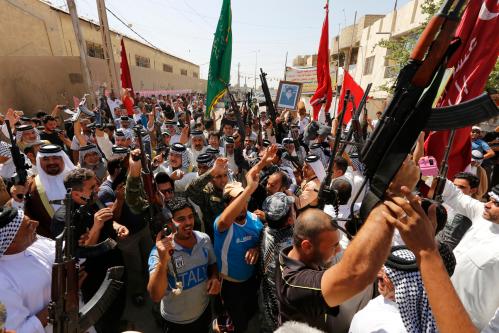President Trump has embarked on a policy that could lead to the loss of U.S. influence in Iraq and the worsening of the Sunni-Shiite divide there, argue John Allen and Michael O’Hanlon. This post originally appeared in the Washington Post.
Though he campaigned with the urgent goal of defeating the Islamic State and reasserting American greatness, President Trump has embarked on a policy that could in fact lead to the loss of U.S. influence in Iraq and the worsening of the Sunni-Shiite divide there. Whatever happens in the short term in the fight to liberate Mosul and other parts of the country from the Islamic State, this policy could lay the groundwork for the emergence of another similar Salafist group there. Trump would have taken us backward, not forward, in the fight against terrorism and seriously eroded our role in a key Arab state that so many Americans gave so much to free and then to help stabilize under two presidents.
The immediate cause of our concern is the executive order Friday that prevented the movement of most Iraqis to the United States—including some who served and sacrificed alongside U.S. forces in the war there—along with citizens of six other nations in the region. But in fact the problem is broader and deeper.
First, there were the frequent whiffs of Islamophobia from the Trump campaign and national security adviser Michael Flynn’s harsh critiques of Islam. Both Trump and Flynn are using more moderate rhetoric now—and the more moderate words may in fact reflect their true attitudes. Certainly, in working with Flynn over the years, neither of us saw Islamophobia in his thinking when he was in uniform. Indeed, his measured analysis of the Salafist threat made important contributions to the defeat of al-Qaeda in Iraq and in our operations against the Taliban. But the harsher words from the campaign, and Flynn’s book, are widely known. They help to create a highly combustible atmosphere in which new decisions such as last week’s executive order will be interpreted. This bell cannot be unrung without determined outreach by the White House to Muslims in the United States and around the world.
Second was Trump resurfacing his position last week that the United States should seize Iraqi oil because it underwrote the Islamic State’s war-making capabilities. He is apparently tone-deaf to the global reaction to this kind of “to the victor goes the spoils” talk, much less the Iraqi reaction.
Moreover, on the specifics of the argument, Trump is incorrect. Iraqi oil fields contributed almost nothing to the Islamic State’s revenue stream, as the vast majority of oil-related funds have come from Syrian fields, and in particular sales of oil back to the regime of Syrian President Bashar al-Assad. Moreover, pillage (this is the legal term for it) of Iraqi oil is simply illegal under international law. Last week, Iraqis were furious over this repeated call by Trump, with some even girding themselves to fight to defend their sovereign natural resource. If Trump decided to literally seize the oil, the U.S. troop requirements would be more akin to the large Iraq and Afghanistan operations of years past than the much more sustainable troop levels that characterize our Mideast presence today. One thing such a mission would likely manage to do, beyond utterly inflaming the region, is unite Iraqis in a common cause heretofore elusive: We’d be fighting Sunnis, Shiites and Kurds all at once.
Then comes the executive order itself. Trump’s travel ban was responded to over the weekend by the Iraqi parliament, many of its members already upset by Trump’s proposed shift of the U.S. Embassy in Israel from Tel Aviv to Jerusalem. The presence of our 6,000 troops helping Iraqi forces in the fight against the Islamic State could be imperiled.
U.S. officials report that Trump’s travel ban and his call for seizing the oil fields have severely undercut the credibility of Iraqi Prime Minister Haider al-Abadi and could cause his government to fall. There is no telling what could come after Abadi, but with the critical Mosul battle reaching the final furlong, Iraqi Shiite leaders may decide they can clear all that remains of the Islamic State from Iraq without U.S. help, leaning instead on Iran and Russia—as they’ve seen occur in Syria. This may not work. Even if it does, it is exactly what many of the Shiite Iraqi nationalists have wanted all along. A tactical success against the Islamic State could, as noted, immediately begin to sow the ground for the return of a future extremist, Salafist force given the likely resentment among Sunnis that would ensue.
It does not end there. Iran also says it will retaliate against the United States for the travel ban. At a practical level, this could easily play out in Iran simply unleashing the extremist Shiite militias to attack Americans in Iraq.
At the very moment that Trump has sought to up the game against the Islamic State, his words and actions treat Iraq and Iraqis as though they’re irrelevant to the defeat of this organization. Indeed, the worst blows potentially preventing the defeat of the Islamic State have been landed by Trump himself and could lead to the end of the U.S. mission and American influence there. For all the ups and downs in Iraq over the past 14 years, we do currently have a friendly government of national unity (more or less) in Iraq right now, and it is controlling most of its own territory against various extremist forces while gradually restoring stability to the nation. All of that is now at new acute risk not from the Islamic State, Syria or Moscow, but from Washington.
The Brookings Institution is committed to quality, independence, and impact.
We are supported by a diverse array of funders. In line with our values and policies, each Brookings publication represents the sole views of its author(s).












Commentary
Don’t recklessly reverse Americans’ progress in Iraq
February 2, 2017